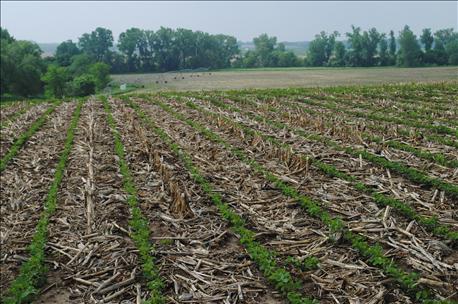
Along with a big room full of farmers, I sat in on a recent talk by Dr. David Kohl at an AgriVisions meeting sponsored by First Dakota National Bank in Yankton, S.D. Dr. Kohl is a well-known agricultural and applied economics professor from Virginia Tech University. You can read upcoming articles based on the words of wisdom from Kohl in an upcoming print article in Dakota Farmer by me and in Nebraska Farmer by Don McCabe. But I wanted to share one suggestion Kohl mentioned, almost in passing that I thought was quite relevant to our discussions about controlling costs to maintain profitability in 2016.

BUILDING RESILIENCE: In the soil and in the farm's bottom line.
There will be a temptation to find one area of production and just chop away. But Kohl told producers that they are better off trimming a little from several expense areas to get to where they want to be. You probably can’t cut 30% from one single aspect of the operation, but you could trim 2-3% from several input categories. It just makes sense. Like always, there is no silver bullet solution for big problems. It often takes a balanced and thoughtful approach to get to the goal line.
We hear the word “sustainable” thrown out all the time. Is your farm sustainable? And this word can mean different things. Is the farm sustainable from an environmental standpoint? Is the farm sustainable from a financial standpoint?
Related: What I overheard at the Cornhusker Economic workshop
I think the days of talking about sustainability under both of these viewpoints are passing. Now, we hear the word “resilience” used by more and more. To me, sustainable simply means holding the status quo. It means sustaining what we have for a long period.
When we talk about resilience, we are talking about something more. Environmental resilience on the farm to me means not only the ability to sustain natural resources, but also to overcome weather challenges and even disasters and bounce back better than ever, and to enhance and build on what we have. When we talk about financial resilience, as we are now, we are talking about the ability to overcome and perhaps even profit from opportunities embedded in the challenges and coming out on the other side better than ever. That’s something to shoot for, even if there is no silver bullet answer and it takes time and patience to figure it out.
Bonus: Palmer hay grower named NAMA producer of the year
Check out the latest local farm news at Nebraska Farmer online or our Facebook page. Be sure to follow me on Twitter @HuskerHomePlace or Editor, Tyler Harris @tyharris08.
About the Author(s)
You May Also Like






